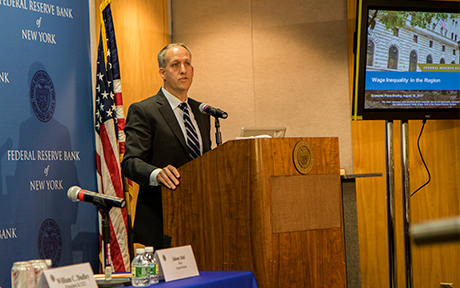Just Released: Are Employer‑to‑Employer Transitions Yielding Wage Growth? It Depends on the Worker’s Level of Education

The rate of employer-to-employer transitions and the average wage of full-time offers rose compared with a year ago, according to the Federal Reserve Bank of New York’s July 2018 SCE Labor Market Survey. Workers’ satisfaction with their promotion opportunities improved since July 2017, while their satisfaction with wage compensation retreated slightly. Regarding expectations, the average expected wage offer (conditional on receiving one) and the reservation wage—the lowest wage at which respondents would be willing to accept a new job—both increased. The expected likelihood of moving into unemployment over the next four months showed a small uptick, which was most pronounced for female respondents.
Just Released: Economic Press Briefing Focuses on Regional Wage Inequality

The New York-Northern New Jersey region is home to some of the most and least unequal places in the nation, based on research presented today at our economic press briefing examining wage inequality in the region. Wage inequality—meaning the disparity in earnings between workers—has increased significantly in the United States since the early 1980s, though some places have much more wage inequality than others. Fairfield, Conn., for example, ranks as the most unequal metropolitan area in the country, and the New York–Northern New Jersey metropolitan area ranks in the top ten. On the other hand, most of the metropolitan areas in upstate New York are among the least unequal places in the country.
Hey, Economist! Is Now a Good Time to Be Graduating from College?

A Conversation with Jaison R. Abel and Richard Deitz With the 2017 college graduation season in full swing, we thought it would be helpful to take stock of the job prospects for recent college graduates. Is now a good time to be graduating from college? Publications editor Trevor Delaney caught up with Jaison Abel and […]
What Caused the Decline in Interstate Migration in the United States?

Geographic mobility is thought to be important both for economic mobility and for the efficiency of a labor market in allocating the right people to the right jobs. Accordingly, the willingness of the U.S. workforce to move is a factor behind the greater dynamism of the U.S. labor market compared to Europe. While Europeans tend to be more reluctant to move to distant places within their respective countries, the idea of moving across state borders for a job has been woven into the fabric of the American Dream. However, the image of the United States as a mobile nation has changed substantially over recent decades. This post investigates the role that demographic shifts—in particular, the nation’s aging population—have played in the recent decline in interstate migration.
Just Released: Job Growth in the Region
At today’s economic press briefing, we provided an update on regional economic conditions, with a particular focus on job growth in the region, and highlighted an important emerging labor market trend: the return of middle-wage jobs.
Do Unemployment Benefits Expirations Help Explain the Surge in Job Openings?
Job openings are arguably one of the most important indicators of recovery in the labor market, as they reflect employers’ willingness to hire.
From Our Archive: Reading Labor Market Slack
In her speech “Labor Market Dynamics and Monetary Policy” at the Kansas City Fed’s recent Jackson Hole symposium, Fed chairwoman Janet Yellen discussed economic puzzles challenging policymakers, including topics we’ve addressed on Liberty Street Economics.
Why Is the Job‑Finding Rate Still Low?
Fluctuations in unemployment are mostly driven by fluctuations in the job-finding prospects of unemployed workers—except at the onset of recessions, according to various research papers (see, for example, Shimer [2005, 2012] and Elsby, Hobijn, and Sahin [2010]).
A Mis‑Leading Labor Market Indicator
The unemployment rate is a popular measure of the condition of the labor market.
Skills Mismatch, Construction Workers, and the Labor Market
Recessions and recoveries typically have been times of substantial reallocation in the economy and the labor market, and the current cycle does not appear to be an exception.











 RSS Feed
RSS Feed Follow Liberty Street Economics
Follow Liberty Street Economics